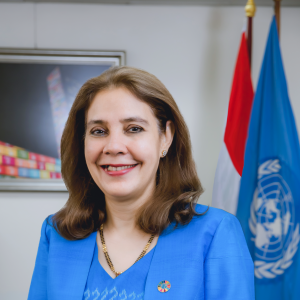After 4 years as Resident Coordinator in Thailand, I am five months into my job as the RC in Indonesia, the world’s largest archipelago, upper middle-income country with three out of five people living in urban centres, a growing youth demographic dividend and an expanding middle class.
Indonesia has an impressive development trajectory. 62% of SDGs are on track, and all goals are moving in the right direction.
However, over one in 10 districts remain disadvantaged with lagging development outcomes. Bridging this development divide requires an additional $1.7 trillion to close the financing gap.
In an emerging economy like Indonesia’s the UN is only as good as the partnerships it fosters.
The government aims for Indonesia to be a developed nation within two decades by prioritising human capital development, low-carbon growth and digital transformation.
These national priorities form the basis of a key instrument effected by the reforms that began in 2019, namely the UN’s collective Cooperation Framework with the government, supported by coordination between line ministries and the United Nations Country Team through a consultative forum.
My role as RC is to ensure a whole-of-UN approach while the MoFA ensures a whole-of-government approach to accelerate SDGs.
These partnerships translate into 3 scalable strategies:
First, the UN’s partnership with the government and private sector has already unlocked $10 billion through thematic sovereign SDG and green bonds.
Of this, $3.2 billion were mobilised last year, benefiting 48 million people, half of them women and children, through SDG-related government programs such as vaccinations, scholarships, and basic services.
The UN is also partnering with five national banks that have adopted the UN’s principles of responsible banking to develop sustainable financing plans and scale up Environmental, Social and Governance investments.
Every percentage point increase in ESG investments by these banks unlocks $1.23 billion for green growth.
This has been catalyzed by another instrument to enable collective action, namely, the SDG Joint Fund.
Second, the UN supports the government’s just energy transition by investing in a smart grid for Java and Bali islands.
This allows renewables to come online while prioritising hydro and solar power for remote islands - an enabler for green jobs and leaving no one behind.
The UN is also introducing best available technologies in the iron, steel, fertiliser and aquaculture sectors with nearly 1,000 factories and 5 industrial parks.
Cumulatively this contribute to reducing Greenhouse Gases by nearly 7%.
Third, we are supporting the government’s nutritious school meals programme, which aims to reach over 78 million infants, children and pregnant mothers to address stunting, a key development priority of the President elect.
As RC, I have brought the key UN entities together – namely, UNICEF, WHO, WFP, IFAD and FAO - to comprehensively support the government to analyse supply chains, food safety and diversity, bio fortification, and innovative financing models, including a potential SDG bond for this program, while coordinating closely with the IFIs.
In summary, accelerating SDGs in Indonesia will require innovative financing at scale and broad-based partnerships for inclusive and forward-looking pathways, including a commitment to use south-south cooperation across the region and beyond.









